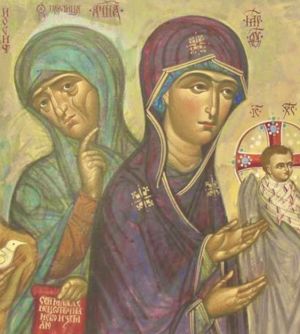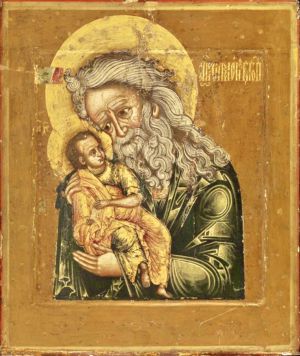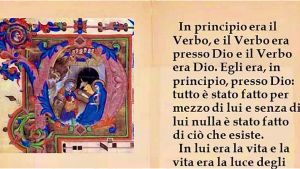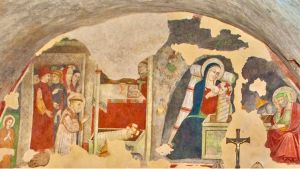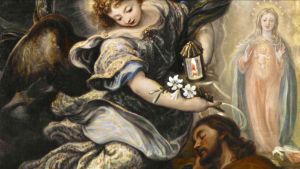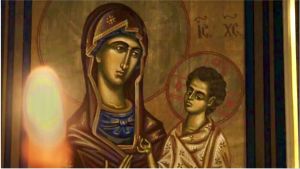
Teresa Girolami
Teresa Girolami è laureata in Materie letterarie e Teologia. Ha pubblicato vari testi, fra cui: "Pellegrinaggio del cuore" (Ed. Piemme); "I Fiammiferi di Maria - La Madre di Dio in prosa e poesia"; "Tenerezza Scalza - Natura di donna"; co-autrice di "Dialogo e Solstizio".
In his Prologue, John speaks to us of the Word made one of us, as a sign of God's gratuitous love and unwavering faithfulness towards us.
In his autograph writings, in his Letter to the Faithful, Francis emphasises:
"The Most High heavenly Father, through his holy angel Gabriel, announced this Word of the Father, so worthy, so holy and glorious, in the womb of the holy and glorious Virgin Mary, and from her womb he received the true flesh of our humanity and frailty.
He who was rich above all else, chose in this world, together with the most blessed Virgin, his mother, poverty" (FF 181-182).
And Clare in her Testament echoes this by saying:
"The Son of God became our Way; and this by word and example our blessed father Francis, a true lover and imitator of Him, showed and taught us" (FF 2824).
Yes, Francis contemplated the Word of God made flesh.
That is why the sacred live nativity scene was born, to see with the eyes of the body the hardships suffered by the God made one of us.
The Sources say:
"The Saint is there ecstatic before the crib, full of sighs, his spirit vibrating with compunction and ineffable joy" (FF 469).
«And we have contemplated his glory» (Jn 1:14).
Francis and Clare meditate and contemplate the Fullness of Light that has come to visit us as the rising sun that gives Hope to all men, those reborn of water and the Spirit.
31 December - VII day between the Octave of Christmas (Jn 1:1-18)
«He began to praise God and spoke of the Child to those who were waiting for the redemption of Jerusalem» (Lk 2:38)
Francis of Assisi considered Holy Christmas the feast of feasts. From there, in fact, had started the salvific parable of a merciful Father who wanted to "unroll like sackcloth" his divinity and humanity through the Gift of his Son.
That is why he infinitely praised God and spoke of the Child and the salvation He brought to all men at every opportunity, opportune and not opportune.
The depth of his prophetic spirit, received by Grace, made him capable of going beyond the immediate with refined inner insight.
In the Treasury of Sources we find particularly significant passages:
"The man of God stood before the manger, filled with pity, sprinkled with tears, overflowing with joy.
The holy sacrifice is celebrated above the manger and Francis, Christ's Levite, sings the holy Gospel.
He preaches to the people and speaks of the birth of the poor king and, in naming him, calls him, out of tenderness of love, the 'Child of Bethlehem'.
A virtuous and sincere knight who had left the scholastic militia and had become very attached to the man of God, Mr John of Greccio, claimed to have seen, inside the manger, a beautiful sleeping child, whom the blessed Francis, holding him with both arms, seemed to rouse from sleep.
This vision of the devout knight is rendered credible by the holiness of the witness, but it is also substantiated by the truth it indicates and confirmed by the miracles by which it was accompanied.
For the example of Francis, re-proposed to the world, had the effect of reawakening faith in Christ in numb hearts; and the hay from the manger, preserved by the people, had the power to heal sick beasts and drive away various other diseases.
Thus God glorifies his servant in all things and shows the efficacy of holy prayer with the probing eloquence of miracles" (FF 1186).
And Clare herself, the first plant of the Seraphic Father, in her stupendous Testament, while entrusting all her present and future daughters to the custody of the Lord Cardinal, expresses herself thus:
"For the love of that Lord, who poor at his birth was placed in a crib, poor lived on earth and remained naked on the cross, may he take care to make this little flock of his observe - this which the Most High Father, through the word and example of our blessed father Francis, generated in his holy Church precisely to imitate the poverty and humility of his beloved Son and of his glorious Virgin Mother [...]" (FF 2841).
Francis and Clare of Assisi: two stars of the firmament that illuminate the salvific Mystery of a God made flesh, who came to give Himself to every person and reality that claims salvation.
30 December - sixth day between the Octave of Christmas (Lk 2:36-40)
Jesus, brought to the temple by Mary and Joseph, is greeted by the watchman Simeon as «a sign of contradiction [...] that the thoughts of many hearts may be revealed» (Lk 2:34-35).
Francis, in the time in which he lives and following the example of Christ, incarnates, as herald of the Great King, being a prophet and becoming a sign of contradiction, an indispensable condition for entering the Kingdom of God.
A sign of contradiction because he is the bearer of a new world, which leaves behind the remnants of the old one, far removed from the Love that came down from Heaven.
The Sources offer several examples of this being the germ of a new way of thinking.
We read:
"The man of God, wounded by his father's curses, chose a despised poor man as his father and said to him:
"Come with me, and I will give you part of my alms. When you see my father curse me, I will say to you: Bless me, O father! - And thou shalt make the sign of the cross upon me and bless me in his stead'.
As the poor man blessed him thus, the man of God said to his father:
"Do you not think that the Lord can give me a father who, against your curses, will cover me with blessings?".
Many of those who mocked him, seeing him endure all those tribulations with patience, were struck with awe and admiration" (FF 1423).
«Sign of contradiction [...] that the thoughts of many hearts might be revealed» (Lk 2:34-35)
And again, moved by the Spirit, he prophesied concerning St Clare and her sisters:
"There were also other people to help him with the restorations. Francis, radiant with joy, said in a loud voice, in French, to his neighbours and to those who passed by:
"Come, help me in these works! Know that a monastery of ladies will be built here, and by the fame of their holy life, our heavenly Father will be glorified throughout the church'.
He was animated by a prophetic spirit, and foretold what would actually happen.
It was precisely in the sacred place of San Damiano that the glorious and admirable Order of poor women and holy virgins was happily initiated by Francis, about six years after his conversion" (FF 1426).
"Many made fun of him, persuaded that he had given them the run-around; others were pitied to the point of tears, seeing that young man pass so quickly from a life of pleasures and caprices to an existence transfigured by the intoxication of divine love. But he, heedless of ridicule, gave fervent thanks to God" (FF 1421).
Yes, this child who became a bold young man, leaving the merry band, is transformed by Grace into that indisputable sign of contradiction that brings to light the truth that dwells in every heart, in the footsteps of Christ.
And, when the mission was accomplished, before his brothers, having himself placed on the bare ground, he reminded them that he had pledged to do his part and that the Lord would instruct them to do theirs.
29 December - fifth day between the Octave of Christmas (Lk 2:22-35)
One of us. Prologue of Jn, Francis and Clare
Conversion of John the Baptist. Least is the greatest
«You too will experience what is reserved». Franciscan Advent
Christ the King: Throne of the Cross and Jesus mocked, Herald
Anyone who welcomes the Lord into his life and loves him with all his heart is capable of a new beginning. He succeeds in doing God’s will: to bring about a new form of existence enlivened by love and destined for eternity (Pope Benedict)
Chi accoglie il Signore nella propria vita e lo ama con tutto il cuore è capace di un nuovo inizio. Riesce a compiere la volontà di Dio: realizzare una nuova forma di esistenza animata dall’amore e destinata all’eternità (Papa Benedetto)
You ought not, however, to be satisfied merely with knocking and seeking: to understand the things of God, what is absolutely necessary is oratio. For this reason, the Saviour told us not only: ‘Seek and you will find’, and ‘Knock and it shall be opened to you’, but also added, ‘Ask and you shall receive’ [Verbum Domini n.86; cit. Origen, Letter to Gregory]
Non ti devi però accontentare di bussare e di cercare: per comprendere le cose di Dio ti è assolutamente necessaria l’oratio. Proprio per esortarci ad essa il Salvatore ci ha detto non soltanto: “Cercate e troverete”, e “Bussate e vi sarà aperto”, ma ha aggiunto: “Chiedete e riceverete” [Verbum Domini n.86; cit. Origene, Lettera a Gregorio]
In the crucified Jesus, a kind of transformation and concentration of the signs occurs: he himself is the “sign of God” (John Paul II)
In Gesù crocifisso avviene come una trasformazione e concentrazione dei segni: è Lui stesso il "segno di Dio" (Giovanni Paolo II)
Only through Christ can we converse with God the Father as children, otherwise it is not possible, but in communion with the Son we can also say, as he did, “Abba”. In communion with Christ we can know God as our true Father. For this reason Christian prayer consists in looking constantly at Christ and in an ever new way, speaking to him, being with him in silence, listening to him, acting and suffering with him (Pope Benedict)
Solo in Cristo possiamo dialogare con Dio Padre come figli, altrimenti non è possibile, ma in comunione col Figlio possiamo anche dire noi come ha detto Lui: «Abbà». In comunione con Cristo possiamo conoscere Dio come Padre vero. Per questo la preghiera cristiana consiste nel guardare costantemente e in maniera sempre nuova a Cristo, parlare con Lui, stare in silenzio con Lui, ascoltarlo, agire e soffrire con Lui (Papa Benedetto)
In today’s Gospel passage, Jesus identifies himself not only with the king-shepherd, but also with the lost sheep, we can speak of a “double identity”: the king-shepherd, Jesus identifies also with the sheep: that is, with the least and most needy of his brothers and sisters […] And let us return home only with this phrase: “I was present there. Thank you!”. Or: “You forgot about me” (Pope Francis)
Nella pagina evangelica di oggi, Gesù si identifica non solo col re-pastore, ma anche con le pecore perdute. Potremmo parlare come di una “doppia identità”: il re-pastore, Gesù, si identifica anche con le pecore, cioè con i fratelli più piccoli e bisognosi […] E torniamo a casa soltanto con questa frase: “Io ero presente lì. Grazie!” oppure: “Ti sei scordato di me” (Papa Francesco)
Thus, in the figure of Matthew, the Gospels present to us a true and proper paradox: those who seem to be the farthest from holiness can even become a model of the acceptance of God's mercy and offer a glimpse of its marvellous effects in their own lives (Pope Benedict))
Nella figura di Matteo, dunque, i Vangeli ci propongono un vero e proprio paradosso: chi è apparentemente più lontano dalla santità può diventare persino un modello (Papa Benedetto)
duevie.art
don Giuseppe Nespeca
Tel. 333-1329741
Disclaimer
Questo blog non rappresenta una testata giornalistica in quanto viene aggiornato senza alcuna periodicità. Non può pertanto considerarsi un prodotto editoriale ai sensi della legge N°62 del 07/03/2001.
Le immagini sono tratte da internet, ma se il loro uso violasse diritti d'autore, lo si comunichi all'autore del blog che provvederà alla loro pronta rimozione.
L'autore dichiara di non essere responsabile dei commenti lasciati nei post. Eventuali commenti dei lettori, lesivi dell'immagine o dell'onorabilità di persone terze, il cui contenuto fosse ritenuto non idoneo alla pubblicazione verranno insindacabilmente rimossi.



